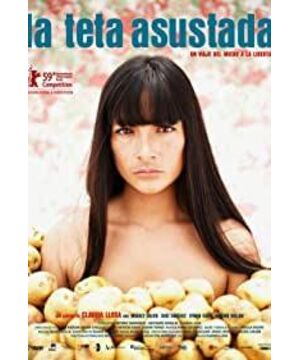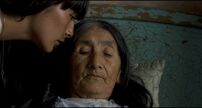"Maybe one day, you will understand how long I cried. That night I screamed, and my voice echoed in the valley for a long time. This woman who sang was raped that night..." In "Sad Milk", The weak and sad singing of a dying old woman cuts through the film's initial shady curtain, throwing a seemingly light-hearted death and fear before the audience as an introduction to the story. The film thus has a dark tone, which neutralizes a lot of emotional colors. The theme that Peruvian director Claudia Losa intends to show is the endless hope after sadness.
Sequelae of "castration anxiety"
A Peruvian woman named Fasta, in order to reject "disgusting rape" and possible pregnancy, carried out "disgusting" self-defense-putting a potato in YD to block all possible .
This reminds me of Freud's belief that women also have "castration anxiety," inherited from their fathers. This statement is actually very nonsense, but Fasta's symptoms are quite "castration anxiety".
Fasta's mother was raped and her husband killed more than 20 years ago during the unrest in Peru, and people say the mother's misery and fear were brought to her daughter by breastfeeding. Afraid of the tragic fate of her mother, Fasta uses potatoes to "castrate" herself to gain a sense of security, which triggers the pain and anxiety on the verge of mental breakdown.
That era of great pain did not die out because of the death of the mother, and the shadow it left behind still gnaws at the next generation.
It is said that Fasita's soul was buried in the ground because of fear, and thus became a soulless being. In the lively crowd, she was like an easily recognizable walking corpse, with a sallow complexion and expressionless expression, only her trembling gait showed that she still had an uneasy living heart.
Except for her, everyone lives happily. In Lima, the "rainless city" in Peru, which we are very unfamiliar with, the poor people in the suburbs ushered in one after another collective carnival weddings. The background is the desolate city fringe, the humble bungalows they live in, the bare mountains in the distance, the whole world is covered in lifeless gray, and you will be very depressed because you can't find any green grass and slightly pleasing scenery, However, the smiles of the poor are still envious, and the white gauze skirts of the brides are flying wildly. People dance happily to clumsy and outdated slow four dances, unaware that Fasta's fear takes root with the potatoes in her body, and that her dead mother has no money to be buried, wrapped in a mummified corpse and hidden in a certain room by someone. under the bed.
The plot is dark and obscure, and even though Fasta, who loves to sing, sings so beautifully, bystanders can't relax.
It should be said that the director has incorporated many deep meanings into Fasta, such as the lack of security left over from the history of turmoil in Peru, people's desire to continue living in the trauma, the desire for the future, the endless people on the barren land, and women Self-awakening, the film is full of hints, and the heavy narrative goes to the end unexpectedly full of comfort.
Fasta's panic, self-"castration" and "castration anxiety" caused by her absurd dependence on potatoes were inherited not so much from her mother's sad milk, but from her mother's lifelong nightmare like a maggot.
The dawn of the turning point of the potato blossom
is in the home of a wealthy white female pianist. The gardens there are lush and green, and the gardeners are kind, and Fausta, a Filipino servant, begins to hum a song in exchange for the hostess' pearls. She opened the door to the gardener with a flower in her mouth, her waxy face animated by the flowers. The gardener's gentleness and kindness made Fasta gradually let go of her prejudice and guard against men, and their communication was still a pun-like dialogue.
"There are geraniums, camellias, daisies, cacti, and sweet potatoes in the garden, but there are no potatoes!" Fasta said angrily to the gardener, as if she was fighting for the right to take care of herself. How she prefers to avoid rape, and refuses to be pregnant with nasty potatoes!
"Potatoes are cheap and rarely bloom," the gardener replied after a moment's thought.
In the film, the potato is an important symbol of decryption. The ordinary and cheap potatoes are like ordinary Fasta and the poor and unfair fate of people in the ghetto. The ignorance from the poor village and the sadness and fear left by her deceased mother made her afraid of death and life like a frightened bird. Her "Mermaid" ballad was stolen by the female pianist and won the concert, but she did not get the pearl promised by the other party. At the base of the pyramid, a large number of poor people are the natural masters of the land, but their fate since ancient times has been to be abused and oppressed without end. Fasta's uncle is by no means the only one who often sings and dances, lives happily, and sometimes weeps because of his trivial fate.
The awakening of self-consciousness will always break out in the forbearance of submissiveness, which is manifested in the two runs of Fasta.
For the first time, in the middle of the night at the end of a wedding banquet, Fasta's uncle pretended to strangle Fasta, arousing her strong desire for life. She ran out with the hem of her dress, the desolate slums behind her showed a noble and extraordinary blue under the sparse street lights, her dress could not be seen how cheap under the cover of the night, and her wax-like face was because of a pair of The fearless persistence of the brave is unprecedentedly moving. She ran all the way to the female pianist, crouched down in front of the portrait of a soldier who made her nervous and nauseous, a symbol of violent killing, and picked up pearls on the ground.
The second time, on the way Fasta sent her mother's body back to her hometown for burial, she saw the sea from a distance, insisted on carrying her mother's body, and walked across a large desert to the sea. She walked forward, clearing the fog in her heart to find a little light ahead, but it took too much effort before, so she got the pearl, and let her mother finally see the sea after her death and send it back to her hometown for burial, which is a great consolation , but not enough to make her happy, she is still very calm.
At the end of the film, a pot of blooming potatoes is delivered to Fasita, with leaves and flowers drooping cutely, just like the water-deficient appearance of plants in the "rainless city". Let the potato return to the soil, let it follow the healthy and natural trajectory, and bravely open its own flowers. Potatoes are very cheap, but the flowers of life are not expensive or cheap.
The blooming potatoes made the smile on Fasta's face look like a new life. After the awakening of self-consciousness, Fasta will be waiting for her, the blossom of life.
View more about La teta asustada reviews










